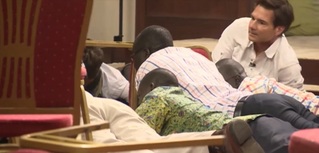 People hiding for shelter during exchanges of fire in Juba People hiding for shelter during exchanges of fire in Juba Two weeks ago I witnessed the building up of tension between several military groups patrolling Juba. I was in South-Sudan for an inception workshop of the Partners for Resilience alliance. One week later, following the date that should have been celebrated as the 5th birthday of the youngest nation on the face of the planet, new violence broke out in its capital Juba leaving many soldiers killed and civilians trying to get to safe spaces in and around the city. The program I ran the inception workshop for was to improve linkages between relief and development using an integrated risk management approach. Disaster risk reduction, climate change adaptation and ecosystem management and restoration were to be combined to provide for improved resilience. I realise how lofty an ambition that is for a country torn apart as a result of internal strife over control of natural resources. Soon the violence in South-Sudan already made way in the news for the disaster in Nice and the uprising in Turkey. Still I had a sense that these three events have more in common than officially acknowledged. Poor governance paid its costly price in each of the three countries. President Hollande was not much welcomed in Nice, where the gap between rich and poor is glaring. Erdogan's policies of muting discontent and increased repression is no longer accepted by all his citizens. And also Salva Kiir and Riek Machar have not shown the greatest display of togetherness in recent attempts to implement a peace deal. In South-Sudan the situation is compounded by severe natural and man-made constraints in food production in the past growing season, forcing many people to depend on external aid, of which supplies are now even more insecure. Wat can be done to reconnect governments to citizens? What can be done to stop the global rift between the rich and the poor? Will states be able to provide solutions? Amidst these questions where no one seems to have a proper answer, the best NGOs can do is build resilience to shocks. They are likely to increase in frequency and their impacts seem to deepen. Providing help will increasingly need to factor in capacity building support for risk management. Even more necessary it is to acknowledge people's capacities for relief, recovery and development amidst disasters. Though at times it feels like going one step forward and two backward, with even international staff involved in rehabilitation activities evacuated from South-Sudan. Risks will remain. Understanding each other's risks and having them acknowledged and shared across ethnic and livelihood boundaries is the first requirement, whether in France, Turkey or South-Sudan.
0 Comments
Your comment will be posted after it is approved.
Leave a Reply. |
About meMy name is Reinier van Hoffen. U®Reading
Click here for a summary.
Also find the text of a lecture Dr. Achterhuis held at the 2012 Bilderberg conference. Archives
August 2022
|
AddressNachtegaallaan 26
Ede, the Netherlands |
Telephone+31 (0)6 1429 1569
|
info@uraide.nl
|
 RSS Feed
RSS Feed
















